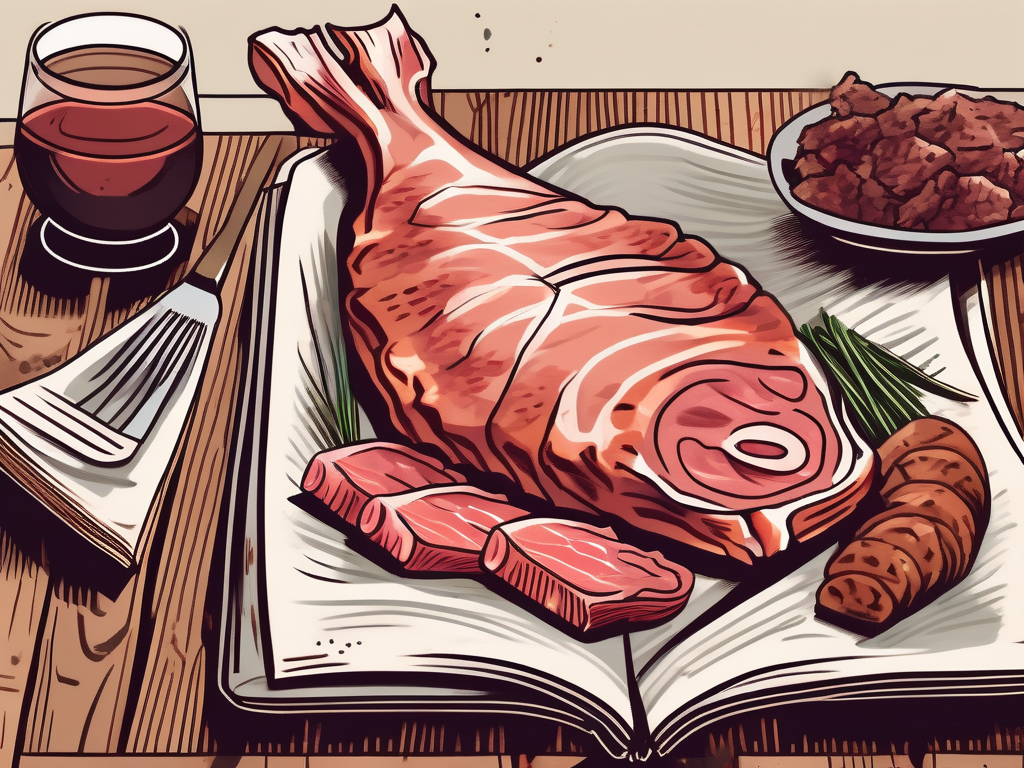Buddhism is an ancient philosophy and religion that has influenced the lives of millions of people around the world. One of the intriguing aspects of Buddhism is its teachings on ethical behavior and the question of what is considered morally acceptable. When it comes to food choices, particularly the consumption of meat, Buddhism offers a unique perspective shaped by its core principles.
Understanding the Core Principles of Buddhism
Before delving into the topic of meat consumption, it is important to grasp the fundamental principles that guide Buddhist teachings. Buddhism is built upon the concepts of compassion, mindfulness, and the pursuit of enlightenment. These principles form the foundation upon which Buddhists make ethical decisions, including dietary choices.
Buddhism is a philosophy and religion that originated in ancient India and is based on the teachings of Siddhartha Gautama, also known as the Buddha. The Buddha’s teachings, known as the Dharma, provide guidance on how to live a meaningful and fulfilling life.
Compassion is at the heart of Buddhist teachings. It is the recognition of the interconnectedness of all living beings and the understanding that causing harm to others ultimately leads to suffering for oneself. This principle of compassion extends not only to humans but also to animals and all forms of life.
The Concept of Ahimsa (Non-violence)
A central tenet of Buddhism is ahimsa, which translates to non-violence or non-harming. This principle extends to all living beings, emphasizing the need to minimize harm and suffering. Ahimsa calls for a mindful and compassionate approach to life, promoting peace and harmony in the world.
Ahimsa is not limited to physical violence but also includes refraining from causing harm through our thoughts, words, and actions. Buddhists strive to cultivate a mindset of non-violence, treating all beings with kindness and respect.
Practicing ahimsa in daily life involves making conscious choices that minimize harm to others. This principle is reflected in various aspects of Buddhist ethics, including dietary choices.
The Middle Way Approach
Another vital aspect of Buddhism is the Middle Way, which encourages individuals to avoid extremes and find balance in all aspects of life. This approach advocates for moderation, recognizing that excessive rigid rules can hinder spiritual growth.
The Middle Way teaches that true happiness and enlightenment can be found by avoiding both indulgence and asceticism. It encourages individuals to find a balanced path that allows them to meet their needs without causing harm to themselves or others.
When it comes to dietary choices, the Middle Way approach encourages Buddhists to find a balance between their nutritional needs and their commitment to non-violence. This may involve adopting a vegetarian or vegan diet, or making conscious choices to support ethical and sustainable food practices.
The Five Precepts
The Five Precepts serve as guidelines for Buddhists to lead a moral and ethical life. While not all Buddhists strictly adhere to these precepts, they often provide a framework for moral decision-making. One of these precepts is to abstain from taking life, which includes refraining from causing harm to living beings.
In addition to abstaining from causing harm, the Five Precepts also include refraining from stealing, engaging in sexual misconduct, speaking untruths, and consuming intoxicants. These precepts serve as a moral compass, guiding Buddhists towards wholesome actions that promote well-being and reduce suffering.
For Buddhists who choose to follow a vegetarian or vegan diet, abstaining from taking life extends to refraining from consuming meat or animal products. This dietary choice aligns with the principle of ahimsa and reflects a commitment to non-violence.
It is important to note that the decision to adopt a vegetarian or vegan diet is a personal one and may vary among individuals based on their interpretation of Buddhist teachings and their own circumstances.
Buddhism and the Consumption of Meat
Now that we have laid the groundwork, let us examine how Buddhism interacts with the topic of meat consumption.
Historical Context of Meat Eating in Buddhism
In ancient times, the Buddha and his disciples were known to consume meat as they relied on alms for sustenance. However, it is crucial to note that the availability and cultural practices around meat consumption were different during that period. The Buddha himself emphasized the intention behind an action, rather than the action itself.
During the time of the Buddha, meat was often obtained as leftovers from households or as alms from laypeople. The Buddha and his disciples would accept whatever food was offered to them, including meat, as a way to practice gratitude and non-attachment. They believed that the act of accepting alms was an opportunity to cultivate humility and mindfulness, regardless of the specific food being offered.
It is important to understand that the Buddha did not explicitly endorse or condemn the consumption of meat. Instead, he encouraged his followers to reflect on the consequences of their actions and make choices that align with their own moral compass.
Different Buddhist Views on Meat Consumption
Over time, different branches of Buddhism developed varying views on the consumption of meat. Some Buddhists choose to follow a vegetarian or vegan diet, aligning their food choices closely with the principles of ahimsa and non-violence. They believe that by not causing harm to animals, they cultivate compassion and reduce suffering.
Vegetarian and vegan Buddhists often argue that the act of killing animals for food contradicts the fundamental teachings of Buddhism, which emphasize the interconnectedness of all living beings. They believe that by abstaining from meat, they are practicing loving-kindness and promoting a more harmonious relationship with the natural world.
On the other hand, many Buddhists continue to consume meat. Their perspective stems from the Middle Way approach and the understanding that the act of eating meat alone does not inherently go against the core principles of the religion. Instead, they focus on the intention behind their actions and strive to promote goodness in other aspects of their lives.
These Buddhists argue that it is possible to consume meat mindfully and ethically. They emphasize the importance of knowing the source of the meat, supporting sustainable and humane farming practices, and expressing gratitude for the nourishment provided by the animal. By approaching meat consumption with awareness and gratitude, they believe they can maintain a balanced and compassionate lifestyle.
It is worth noting that the decision to consume or abstain from meat is a personal choice for Buddhists. The religion does not impose strict dietary rules, but rather encourages individuals to cultivate mindfulness and compassion in all aspects of their lives, including their relationship with food.
Ultimately, the question of meat consumption in Buddhism is a complex and multifaceted one. It involves considerations of cultural context, personal beliefs, and the interpretation of Buddhist teachings. Regardless of one’s stance on the issue, what remains central is the intention behind one’s actions and the commitment to reducing suffering in the world.
The Role of Karma in Dietary Choices
Karma, the law of cause and effect, plays a significant role in how Buddhists approach their dietary choices. It is believed that every action, including what one consumes, has consequences that can affect not only the present life but also future ones. The concept of karma encourages Buddhists to be mindful of their actions and make choices that align with their spiritual beliefs.
The Karmic Consequences of Eating Meat
Buddhists believe that consuming meat raises ethical questions due to the taking of a life, which is seen as a clear violation of the principle of non-violence. According to Buddhist teachings, this act can accumulate negative karma and hinder one’s spiritual progress. The recognition of the interconnectedness of all beings leads many Buddhists to consider the impact of their dietary choices on the well-being of animals and the environment.
When a Buddhist consumes meat, they may ponder the karmic consequences of their actions. They may reflect on the suffering endured by the animal and the potential negative energy associated with its death. This reflection can serve as a reminder to make choices that promote compassion and non-violence.
Furthermore, the karmic consequences of eating meat extend beyond the individual. Buddhists recognize that the demand for meat contributes to the larger cycle of violence in the world. By abstaining from meat consumption, Buddhists aim to break this cycle and promote a more harmonious existence.
How Karma Influences a Buddhist’s Diet
Each individual Buddhist seeks to navigate the complex web of karma based on their unique circumstances, cultural influences, and personal beliefs. While some Buddhists may choose to avoid meat altogether, not wanting to take any chances with bad karma, others may opt for a more mindful approach.
For those who choose to consume meat, they may do so with a heightened sense of awareness and gratitude. They may seek out sources that align with their values, such as organic and ethically raised animals. By acknowledging the sacrifice made by the animal, they aim to cultivate a sense of gratitude and respect for the interconnectedness of all life.
Additionally, some Buddhists may choose to adopt a vegetarian or vegan lifestyle to minimize their impact on the environment and reduce the suffering of animals. By eliminating the consumption of animal products altogether, they believe they can accumulate positive karma and contribute to a more compassionate world.
It is important to note that the approach to dietary choices can vary among Buddhists, as there is no one-size-fits-all solution. Each individual must navigate their own path, guided by their understanding of karma and their personal convictions.
Vegetarianism and Veganism in Buddhism
In recent years, there has been a noticeable rise in vegetarianism and veganism among Buddhists. Let’s explore the reasons behind this trend.
The Rise of Vegetarianism Among Buddhists
Many Buddhists view a vegetarian or vegan diet as an extension of their commitment to non-violence and compassion. By abstaining from consuming animal products, they minimize harm to living beings and promote environmental sustainability.
One of the key teachings in Buddhism is the concept of ahimsa, which means non-violence or non-harming. This principle encourages Buddhists to avoid causing harm to any living being, including animals. By adopting a vegetarian or vegan diet, Buddhists believe they are embodying this principle in their daily lives.
Furthermore, Buddhists also emphasize the interconnectedness of all beings. They recognize that the actions they take can have far-reaching consequences, not only for themselves but also for the world around them. By choosing to follow a vegetarian or vegan lifestyle, Buddhists seek to minimize their impact on the environment and promote sustainability.
Moreover, the rise of vegetarianism among Buddhists can also be attributed to the growing awareness of the negative impacts of animal agriculture. The intensive farming practices and the mass production of animal products have been linked to deforestation, water pollution, and greenhouse gas emissions. By opting for plant-based alternatives, Buddhists aim to reduce their contribution to these environmental issues.
Veganism as an Extension of Buddhist Principles
Veganism, in particular, has gained traction among Buddhists who prioritize the ethical treatment of animals. By excluding not only meat but also dairy, eggs, and other animal-derived products, they strive to align their actions more closely with the principles of compassion and non-violence.
Buddhists who choose to follow a vegan lifestyle recognize that the dairy and egg industries also involve the exploitation and suffering of animals. They believe that by consuming these products, they are indirectly supporting the harm inflicted upon animals in factory farms and other forms of animal agriculture.
Furthermore, Buddhists who embrace veganism often emphasize the importance of mindfulness and awareness in their dietary choices. They carefully consider the origins of the food they consume, seeking to ensure that it is produced in a way that aligns with their values of compassion and non-violence.
For some Buddhists, veganism is seen as a spiritual practice in itself. By consciously choosing to exclude animal products from their diet, they aim to cultivate a deeper sense of compassion and mindfulness in their daily lives. They believe that this practice not only benefits themselves but also contributes to the well-being of all sentient beings.
In conclusion, the rise of vegetarianism and veganism among Buddhists can be attributed to their commitment to non-violence, compassion, and environmental sustainability. By adopting these dietary choices, Buddhists seek to minimize harm to living beings and promote a more compassionate and sustainable world.
Navigating Dietary Choices as a Modern Buddhist
Being a Buddhist in today’s world comes with various challenges and complexities. Let’s explore how modern Buddhists navigate their dietary choices.
Balancing Tradition and Personal Beliefs
Many Buddhists face the task of reconciling traditional practices with their personal beliefs. They consider their cultural background, family traditions, and the teachings of their lineage as they make decisions about meat consumption. This process involves critical self-reflection and finding a balance that resonates with their individual path.
The Impact of Cultural and Geographical Factors
Cultural and geographical factors greatly influence Buddhists’ dietary choices. In some regions, vegetarian or vegan diets are more accessible and widely practiced, making it easier for Buddhists to align their choices with their beliefs. Conversely, in areas where meat is a staple food, Buddhists must find alternative ways to uphold their values, such as supporting sustainable farming practices or participating in advocacy efforts for animal welfare.
Ultimately, Buddhism does not provide a definitive answer to the question of whether one should eat meat. Instead, it encourages individuals to navigate this complex issue with compassion, mindfulness, and an understanding of the unique circumstances they find themselves in. By doing so, Buddhists can make dietary choices that align with their personal beliefs while striving to cultivate a more compassionate and peaceful world.












